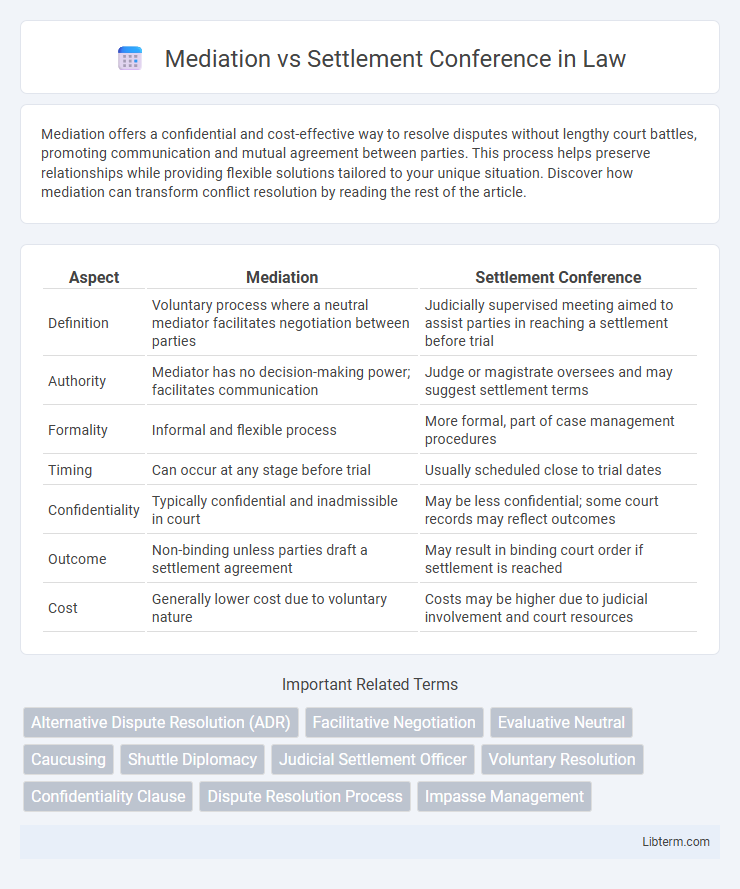Mediation offers a confidential and cost-effective way to resolve disputes without lengthy court battles, promoting communication and mutual agreement between parties. This process helps preserve relationships while providing flexible solutions tailored to your unique situation. Discover how mediation can transform conflict resolution by reading the rest of the article.
Table of Comparison
| Aspect | Mediation | Settlement Conference |
|---|---|---|
| Definition | Voluntary process where a neutral mediator facilitates negotiation between parties | Judicially supervised meeting aimed to assist parties in reaching a settlement before trial |
| Authority | Mediator has no decision-making power; facilitates communication | Judge or magistrate oversees and may suggest settlement terms |
| Formality | Informal and flexible process | More formal, part of case management procedures |
| Timing | Can occur at any stage before trial | Usually scheduled close to trial dates |
| Confidentiality | Typically confidential and inadmissible in court | May be less confidential; some court records may reflect outcomes |
| Outcome | Non-binding unless parties draft a settlement agreement | May result in binding court order if settlement is reached |
| Cost | Generally lower cost due to voluntary nature | Costs may be higher due to judicial involvement and court resources |
Introduction to Mediation and Settlement Conferences
Mediation is a structured, confidential process where a neutral mediator facilitates negotiation between disputing parties to reach a mutually acceptable agreement. Settlement conferences are typically informal meetings overseen by a judge or court-appointed official aimed at encouraging parties to resolve litigation before trial. Both methods emphasize collaboration and cost-effectiveness but differ in formality and the presence of a judicial figure.
Defining Mediation: Goals and Process
Mediation is a structured, confidential process where a neutral third party facilitates communication between disputing parties to help them reach a mutually acceptable agreement. The primary goal is to promote understanding, explore interests, and generate voluntary solutions without imposing decisions. Unlike settlement conferences that involve judicial oversight, mediation emphasizes collaborative problem-solving and preserving relationships.
What Is a Settlement Conference?
A settlement conference is a court-ordered or voluntary meeting where parties in a legal dispute negotiate to resolve their issues before proceeding to trial. It is facilitated by a judge or neutral third party who helps clarify the facts and legal points, aiming to narrow the scope of the case or reach a mutually acceptable agreement. Unlike mediation, settlement conferences tend to be more formal and are often a step within the litigation process designed to promote judicial efficiency and reduce court backlog.
Key Differences Between Mediation and Settlement Conferences
Mediation involves a neutral third party facilitating communication to help disputing parties reach a voluntary agreement, emphasizing collaboration and confidentiality. Settlement conferences are typically judge-led, focused on evaluating the strengths and weaknesses of a case to encourage settlement before trial, often with less emphasis on confidentiality. Unlike mediation's informal and flexible process, settlement conferences are more structured and court-influenced, aiming to expedite case resolution through judicial guidance.
Roles of Mediators vs. Judges or Settlement Officers
Mediators facilitate communication and foster voluntary agreements between disputing parties without imposing decisions, emphasizing neutrality and collaboration. Judges or settlement officers actively evaluate case merits, provide legal guidance, and may suggest or recommend settlement terms based on judicial experience. Unlike judges, mediators do not have decision-making authority, focusing instead on creating a cooperative environment conducive to mutual resolution.
Voluntariness and Party Control in Each Process
Mediation emphasizes voluntariness, allowing parties to retain full control over the resolution and outcomes, as the mediator facilitates but does not impose decisions. Settlement conferences, typically led by a judge, often involve more structured guidance with less party autonomy, where the judge may offer opinions or recommendations to encourage settlement. The distinction in party control is crucial: mediation empowers self-determination, while settlement conferences balance judicial influence with party input.
Confidentiality in Mediation and Settlement Conferences
Confidentiality in mediation is a fundamental principle ensuring that all discussions, offers, and admissions remain private and cannot be used as evidence in court, fostering an open and honest negotiation environment. Settlement conferences may not always guarantee the same level of confidentiality, as information disclosed can sometimes be shared with the judge or used in subsequent litigation. Understanding the distinct confidentiality protections helps parties choose the appropriate dispute resolution method to safeguard sensitive information.
Types of Cases Best Suited for Mediation or Settlement Conferences
Mediation is best suited for family disputes, employment conflicts, and small business disagreements where parties seek a collaborative resolution. Settlement conferences are commonly used in civil litigation, personal injury cases, and contract disputes to narrow issues and encourage plea agreements. Both methods aim to reduce court time, but mediation emphasizes mutual agreement while settlement conferences often involve judicial guidance to facilitate resolution.
Outcomes: Agreements, Enforceability, and Next Steps
Mediation frequently results in mutually agreed-upon settlements that are voluntarily crafted by the parties and can be formalized into binding contracts enforceable in court. Settlement conferences often involve judicial input to guide parties toward resolution, with agreements sometimes subject to court approval, enhancing enforceability and legal weight. Both methods aim to resolve disputes efficiently, but mediation emphasizes collaborative problem-solving, while settlement conferences focus on judicial facilitation and may set clearer next steps if settlement fails.
Choosing the Right Method for Conflict Resolution
Mediation offers a collaborative environment where a neutral mediator facilitates open communication between parties to reach a mutually agreeable solution, making it ideal for preserving relationships. Settlement conferences, often led by a judge or neutral party, involve a more structured negotiation focused on narrowing issues before trial and are suited for cases requiring judicial guidance to evaluate legal positions. Selecting the right method depends on factors such as the complexity of the dispute, the desired level of formality, the parties' willingness to compromise, and whether maintaining ongoing relationships is a priority.
Mediation Infographic

 libterm.com
libterm.com